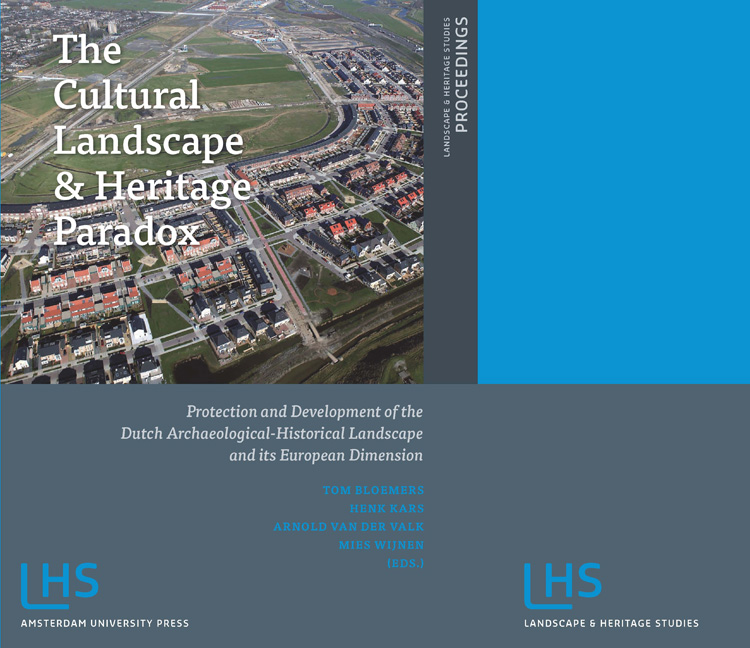 The Cultural Landscape and Heritage Paradox
The Cultural Landscape and Heritage Paradox Book contents
- Frontmatter
- Contents
- Preface
- I INTRODUCTION
- II INSIGHTS AND PROSPECTS OF ARCHAEOLOGICAL-HISTORICAL LANDSCAPE STUDIES
- III LINKING KNOWLEDGE AND ACTION
- IV IMAGINATION - FACTS AND CONSTRUCTIONS
- V SHARING KNOWLEDGE - STORIES, MAPS AND DESIGN
- VI SYNTHESIS AND CONCLUSIONS
- VII MANAGEMENT OF KNOWLEDGE
- VIII AGENDA FOR THE FUTURE
- IX SUMMARY
- X APPENDIX
- Subject Index
- Index of Places and Regions
5 - The good, the bad and the Self-Referential. Heritage Planning and the Productivity of Difference
Published online by Cambridge University Press: 21 January 2021
- Frontmatter
- Contents
- Preface
- I INTRODUCTION
- II INSIGHTS AND PROSPECTS OF ARCHAEOLOGICAL-HISTORICAL LANDSCAPE STUDIES
- III LINKING KNOWLEDGE AND ACTION
- IV IMAGINATION - FACTS AND CONSTRUCTIONS
- V SHARING KNOWLEDGE - STORIES, MAPS AND DESIGN
- VI SYNTHESIS AND CONCLUSIONS
- VII MANAGEMENT OF KNOWLEDGE
- VIII AGENDA FOR THE FUTURE
- IX SUMMARY
- X APPENDIX
- Subject Index
- Index of Places and Regions
Summary
ABSTRACT
Heritage planning as an integrated approach to dealing with traces of the past in the ongoing organization of the landscape cannot be but a transdisciplinary endeavour. As such, the insights gained in work on interdisciplinary and transdisciplinary knowledge production and application should inform any methodology of heritage planning. Bridging differences between scientific disciplines and between sciences and law, administration, politics and economy is a continuous challenge. We argue that Niklas Luhmann's social systems theory, with its sophisticated understanding of society as an evolving and multiplying population of social systems and his insights into the identity and difference of those systems, prove very useful indeed in understanding the value and difficulty of trespassing boundaries in heritage planning and in understanding the value of conflict and cultivated difference in the planning process.
In an attempt to apply Niklas Luhmann's social systems theory to heritage planning, we will reflect on mechanisms of self-reference and self-reproduction that are active within the scientific (heritagerelated) disciplines, (planning) administrations, politics and law. These mechanisms are not in essence negative, they are necessary for the production of the kind of knowledge that is specific for the system or organization.
However, in planning, where some form of co-ordination of interests and types of knowledge is strived for, an acute awareness of these forms of self-reference in all the actors in the planning system is crucial. Without resorting to easy-escape consensus models, we would like to argue for an approach to heritage planning that avoids self-reference in the planning system as a whole while accepting and cherishing the self-reference of the elements, the actors. This, we argue, is necessary to create decision spaces where plans can be made that are truly site-specific, where various forms of heritage can acquire various roles, making different types of knowledge important in different situations.
KEY WORDS
Heritage planning; knowledge; disciplines; self-reference; systems theory, Luhmann
ACTORS IN HERITAGE PLANNING
Heritage planning is an integrated approach to dealing with traces of the past in the ongoing organization of the landscape (compare the contributions in Ashworth/Howarth 1999). In current practice, the traces of the past dealt with usually represent a small part of those traces, a subset that is labelled ‘ heritage’ in the administrative/scientific establishment of the country or region at stake.
- Type
- Chapter
- Information
- The Cultural Landscape and Heritage ParadoxProtection and Development of the Dutch Archaeological-Historical Landscape and its European Dimension, pp. 273 - 290Publisher: Amsterdam University PressPrint publication year: 2010


